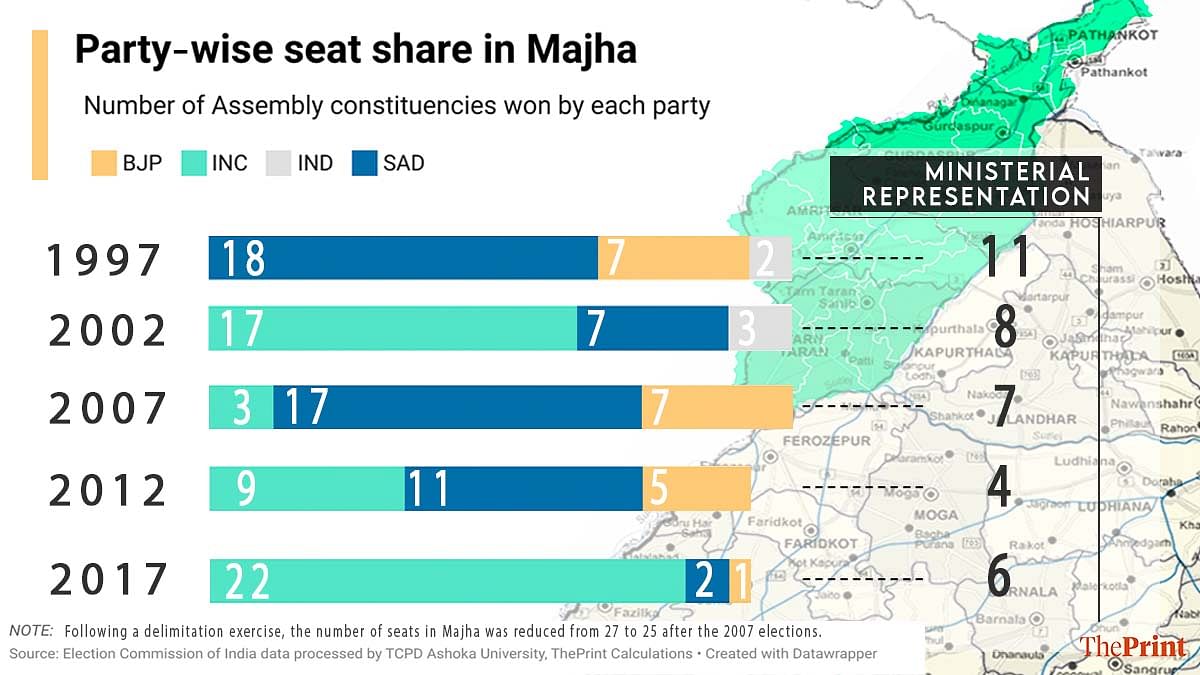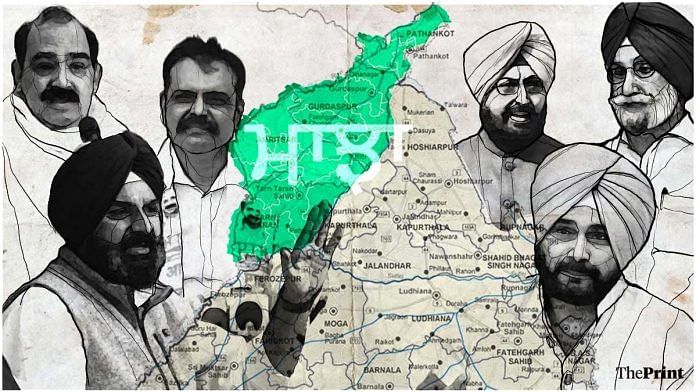Chandigarh: It’s often said that the politics of Punjab is run from the Majha region adjacent to the International Border with Pakistan. But the battle to become “Majhe da jarnail” (the general of Majha) heated up several notches Wednesday when the Shiromani Akali Dal (SAD) announced that Bikram Singh Majithia will fight state Congress chief Navjot Singh Sidhu for the latter’s home seat of Amritsar East.
Majithia — a three-time MLA from Majitha — is the brother-in-law of SAD chief Sukhbir Singh Badal. He was booked in a drugs case in December and is attempting to obtain anticipatory bail. His contesting against Sidhu has turned Amritsar East into one of the hottest seats to watch out for in the Majha region in the forthcoming Punjab Assembly elections, to be held on 20 February.
A number of other top leaders across parties, including current and former ministers, are in the fray in the key region — the centre of Sikh panthic (religious) politics — which has traditionally voted en masse to decide Punjab’s fate.
Majha, at the heart of historical Punjab, was carved in two by Partition, and the Indian side now consists of the four border districts of Amritsar, Gurdaspur, Tarn Taran, and Pathankot. These account for only 25 of the 117 seats in the Punjab Assembly, but have played a dominant role in the state’s electoral history.
Also read: ‘Thor’ Channi, ‘chance’ for Kejriwal & SAD exposing ‘liars & thugs’ in Punjab’s digital campaign
Top leaders in the fray
Apart from the Sidhu-Majithia faceoff, Majha holds the key to the electoral fortunes of half a dozen top Congress leaders who have served as cabinet ministers in the present government, including two deputy chief ministers, Sukhjinder Singh Randhawa and O.P. Soni, as well as Aruna Chaudhary, Tript Rajinder Singh Bajwa, Sukhbinder Singh Sarkaria and Raj Kumar Verka.
Add to this a Rajya Sabha MP, Partap Singh Bajwa, who is contesting from his home seat of Qadian, after being chosen over the sitting Congress MLA and his own brother, Fatehjang Singh Bajwa.
Fatehjang has defected to the BJP, and was declared the party’s candidate from Batala Thursday. He will be up against SAD candidate Sucha Singh Chhotepur — a former state chief of the Aam Aadmi Party (AAP) — and former Congress minister Ashwini Sekhri.
Several leaders who were ministers in the former SAD government (2007-2017) are also contesting from Majha, including Adesh Partap Singh Kairon, grandson of former chief minister Partap Singh Kairon. He lost from Patti in 2017 to the Congress’s Harminder Gill. The two will face-off again in this election.
Majithia is also contesting from Majitha, which he has won three times in succession (2007, 2012, 2017). His competition consists of a pair of brothers: AAP’s Sukhjinder Raj Lalli Majithia — who was the Congress candidate from the seat in 2017 — and the current Congress candidate, Jagwinder Pal Singh Jagga Majithia.
Another former minister, Ranjit Singh Brahmpura — who had broken away from the SAD with several other leaders to form the Shiromani Akali Dal (Taksali), but rejoined his original party in December 2021 — will be fighting from the panthic seat of Khadoor Sahib against the Congress’s Ramanjit Singh Sikki. In 2017, Brahmpura’s son, then-MLA Ravinder Singh Brahmpura, had lost the seat to Sikki.
Former Akali ministers Virsa Singh Valtoha and Gulzar Singh Ranike, who had lost their seats of Khem Karan and Attari respectively in 2017, are in the fray again this time to wrest the two seats from the Congress.
In Majha, the Bharatiya Janata Party (BJP) has traditional strongholds in Pathankot and Amritsar city. Formerly, when it was allied with the SAD, the two parties’ seat-sharing arrangement had allocated eight of Majha’s 25 seats to the BJP.
State BJP chief Ashwani Sharma had lost from Pathankot in 2017, and is being fielded again from the same seat this year. BJP national general secretary Tarun Chugh had also lost from the Majha seat of Amritsar Central in 2017. Of the two MPs the party has from Punjab, actor Sunny Deol represents Gurdaspur, a traditional BJP seat held by actor Vinod Khanna for several years before his death.
AAP, which does not have much of a hold in Majha, has fielded former Punjab cadre IPS officer Kunwar Vijay Pratap Singh from the Amritsar North seat. He is facing former BJP minister Anil Joshi, who joined the Akali Dal last year.
In order to strengthen its position in Majha, AAP had also recruited former Akali minister and veteran leader Sewa Singh Shekhwan last year. However, he passed away in October, and now his son, Jagroop Singh, is the party’s candidate from Qadian, where he will be fighting Partap Bajwa.
Also read: FIR against Sidhu’s adviser and ex-DGP Mustafa over ‘inflammatory’ poll speech in Malerkotla
Majha votes en masse
A key reason for Majha’s significant position in Punjab’s electoral politics is that historically, it has more often than not voted en masse. A good score by any party in Majha has always led to that party forming the government.

Apart from the fact that the Golden Temple — the holiest shrine of the Sikhs — and their highest temporal seat, the Akal Takht, are located in Amritsar, Majha is also the epicentre of Sikh panthic politics, and its districts were the worst affected during the two decades when the state fell under the shadow of terrorism.
The availability of drugs is also a major problem in the region, largely because of the border with Pakistan, from where drugs — and now, weapons — are smuggled into Punjab.
State Congress chief Navjot Sidhu and Deputy CM Sukhjinder Randhawa have centred their campaigns around panthic issues and drugs. Both have attacked former CM Amarinder Singh over such issues, accusing him of failing to ensure justice for Sikhs in the 2015 sacrilege cases and not acting against Majithia in the drugs case against him.
Majha also has a significant Hindu population concentrated in Gurdaspur, Pathankot, and parts of Amritsar city. The Sikh population is largely spread across Tarn Taran, Amritsar and the rural areas of Gurdaspur. But despite these religious and urban-rural divides, Majha tends to vote en masse.
For example, the Congress won a majority of the seats in Majha in 1992, and went on to form the government. The SAD-BJP combine did the same in 1997, routing the Congress in the region. In 2002, the Congress struck back, winning 17 of Majha’s then 27 seats, but it would be left with just three in 2007 when the alliance won the remaining 24.
Ahead of the 2012 elections, the total number of seats in Majha was reduced to 25, and the SAD-BJP alliance held on to 16 of these, and stayed in power in the state — until 2017, when the Congress won 22 of Majha’s seats and swept back into government.
Also read: Ravidas Jayanti & the Dalit vote — why Punjab parties got EC to shift polling date by 6 days
High ministerial representation
This region has also had disproportionately high ministerial representation as the home ground of some of Punjab’s most prominent politicians.
In 1997, when the SAD-BJP combine had 25 Majha MLAs, 11 were made ministers. In Captain Amarinder Singh’s first term as chief minister from 2002 to 2007, the Congress had 17 MLAs from Majha, out of which eight became ministers.
In the 2007-2012 term of the SAD-BJP government, which had 24 MLAs from Majha, seven were made ministers. In the next term, when SAD-BJP had 16 MLAs from Majha, four became ministers.
Of the 18 ministers in the current Congress government, formerly led by Captain Amarinder Singh and now by Charanjit Singh Channi, half a dozen have been from Majha.
However, while Majha has been the home ground of many ministers holding important portfolios, there has been only one chief minister from Majha since Independence: Partap Singh Kairon (1956-64), who came from Kairon village in Tarn Taran. Most of Punjab’s chief ministers have been from the Malwa region.
In September last year, when there were indications that then-cabinet minister Randhawa — an MLA from Dera Baba Nanak in Gurdaspur — would replace Captain Amarinder Singh as CM, his first statement to the press was that Punjab would have a Majhail chief minister after a gap of almost 60 years. But that wasn’t to be.
(Edited by Rohan Manoj)
Also read: Channi involved in illegal mining, claims SAD’s Majithia with ‘proof’. Punjab CM says ‘baseless’



